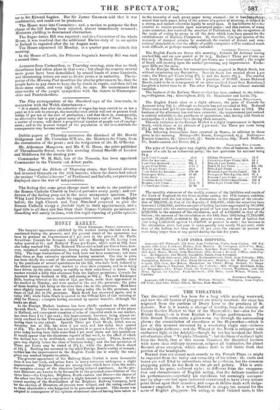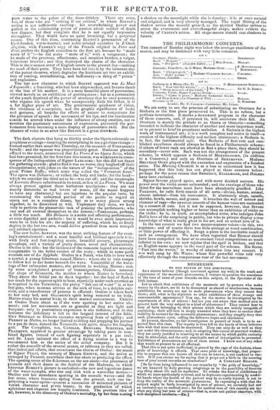THE THEATRES.
THE theatrical world has been for a long while moving westward, and now the old haunts of playgoers are utterly deserted : the stage has migrated from the purlieus of Drury Lane to the precincts of St. James's. Nor is it merely a change of locality, from the vicinity of Covent Garden Market to that of the Haymarket ; but—alas for the British drama !—it is from English to Foreign performances. The little Strand Theatre emits a glow worm ray through the surrounding gloom ; the constellation of comedians at the Haymarket—which is just at this moment traversed by a wandering tragic star—relieves the midnight darkness ; and the Wizard of the North is refulgent with enchanted light at the Adelphi—though he too has invoked the Black aid of certain alien " Virginia Minstrels " : but the blaze of zodiacal light from the South, that at this season illumines the theatrical horizon with more than ordinary splendour, eclipses all luminaries, the planet BousTi alone excepted, which shines forth in full lustre from that portion of the hemisphere. Bourpi does not attract such crowds to the French Plays as might be expected from the rarity and versatility of his talent : the stalls and boxes are well filled by subscribers when he performs, but the common playgoing public do not flock to the pit and gallery. This is attri- butable to his quiet, unforced style ; so different from the exaggera- tion and obtrusiveness of English acting, that the delicate touches of his performances—especially his significant but seemingly unimpor- tant by-play—are lost upon audiences accustomed to have every minute point thrust upon their attention, and coups de thicitre dealt with sledge- hammer emphasis. In a word, BOUFFE is simply too natural for the mass of English playgoers : his acting, to their vitiated taste, is like pure water to the palate of the dram-drinker. There are some, too, of those who are " nothing if not critical," to whom Boneek's acting is not sufficiently exciting : his overwhelming power and pathos at the culminating points of passion admit neither of doubt nor dispute, but they complain that he is not equally impressive throughout. They would have no quiet breathing, but a perpetual spasm. One of this class, contrasting BOUFFeS personation of the hard-banded, warm-hearted, and noble-minded operative in L'Oncle Baptiste, With FARREN'S copy of the French original in Peter and Paul, prefers the English comedian in the first act, because he "made more of it"!—he did make " more of it," with a vengeance ; for be made of the generous, affectionate, and sensitive brother, a vulgar, boisterous brawler ; and thus destroyed the charm of the character. This is the common error of English actors in the present day—making too much of their parts. They have been led into it by the immense size of the patent theatres, which degrades the histrionic art into an exhibi- tion of ranting, attetudiuiziog, and buffoonery—a thing of " points" and explosions.
The last new character in which Botteek appeared was Le Muet d'Ingouville ; a foundling, who had been shipwrecked, and became dumb at the loss of his mother. It is a most beautiful piece of pantomime, viewed merely as an exhibition of gestiloquence ; but as a personation of the youth deprived of the power of utterance that he once possessed, who regains his speech when he unexpectedly finds his father, it is a far higher piece of art. The preternatural quickness of vision, the vividness of conception, and the graphic significance of looks and gestures, all bespoke the efforts of nature to compensate for the privation of speech : the movement of his lips, and the inarticulate sounds he uttered when under the influence of strong emotion, not to mention the passionate earnestness of expression, prevented the per- formance from becoming a mere display of pantomimic skill. But the absence of voice in an actor like Boueen is a great drawback.



























 Previous page
Previous page